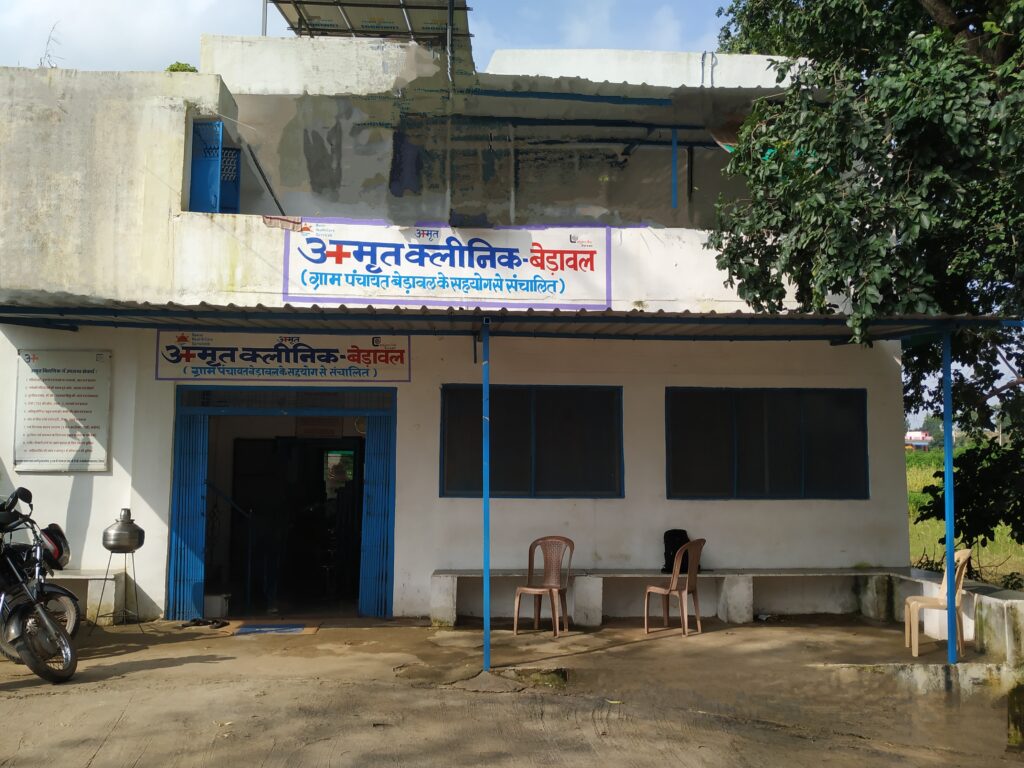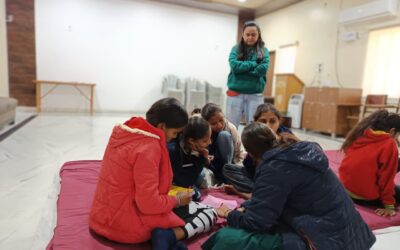As part of my fellowship, i am hosted at Basic Healthcare Services working in southern tribal Rajasthan. I had the opportunity to visit a rural clinic for the first time. This experience shattered many of my preconceived notions. Before this visit, I thought I understood the challenges of healthcare in rural areas, based on statistics, research papers, and theories. I have studied Pharmacy, albeit some years ago now.
But witnessing it firsthand made me realize that no amount of academic knowledge can truly prepare you for the reality on the ground. This experience was not just about observing healthcare practices but understanding the human aspect of it.
Preparing For The Visit
Before heading to the Amrit Clinic, in Bedawal village of Salumber district; I was anxious. It was my first field visit, and I was not sure what to expect. My task was to understand how the clinic operated and gain insights into the daily processes. I had so many questions swirling in my mind.
What would the clinic be like? How would the patients react to my presence? Would I be able to contribute?
The day began with an ambulance picking me up, along with another team member. The journey was quiet for me. I spent most of the time contemplating what lay ahead while the others in the ambulance discussed their work. I was too caught up in my own thoughts to participate. I kept thinking about how I would engage with the patients and staff, unsure if my theoretical knowledge would be of any use in this practical setting.
Arriving At The Clinic
When we arrived at the clinic, I was immediately struck by the sight of a large group of patients waiting outside. This wasn’t like the well-organized waiting rooms I had seen in urban hospitals. These people, many of them women, children, and elderly, sat under the sun, patiently waiting for their turn.
Inside the clinic, the doctor gathered the staff and asked everyone, including me, to introduce themselves. This felt like the formal start of my journey. My task was to observe and understand how the clinic operated, but I quickly realized that this was much more than just observing medical procedures. It was about connecting with people who were in desperate need of healthcare services.
The clinic had already started its day before we arrived. Patients had registered their names, and the clinic staff was busy retrieving case sheets for returning patients and creating new ones for first-time visitors. I moved from counter to counter, observing how the staff worked, the flow of patients, and the organization of medical records. Every station was filled with activity—some staff members were registering patients, while others were updating medical histories.
Despite the bustling atmosphere, there was a sense of order, and each staff member seemed deeply committed to their work. As much as I wanted to ask questions, I didn’t want to disrupt their rhythm, so I quietly took mental notes.

Interactions With Patients
After a while, I decided to step outside and talk to some of the patients waiting for their turn. I was eager to understand their perspective and hear their stories. The first person I approached was a woman sitting alone. I asked her where she was from and whether she had registered her name, but she was hesitant to talk. I could sense her discomfort, and respecting that, I moved on. This initial interaction left me feeling uncertain. I began to wonder if others would be willing to open up to me.
Standing there, I noticed a young man near his motorbike. He seemed approachable, so I decided to try again. As I walked up to him, I asked him the same questions—where he was from, whether he had registered—and this time, I received a warm response. He was more than willing to talk and shared a lot about the situation. This conversation gave me my first real insight into why so many people chose to travel long distances to come to this clinic.
He explained that the hospitals closer to their villages were often poorly equipped, with untrained staff and inadequate treatment. Many patients did not get the relief they needed from these local facilities, and that’s why they preferred coming here, even if it meant traveling 30-40 kilometers. In fact, this young man had come with a neighbour who was unwell. They had left their village at around 5 a.m. to reach the clinic by 7 a.m., a common practice for many.
Importance Of Trust In Healthcare
One of the most significant takeaways from my conversation with the young man was the issue of trust. Patients didn’t just come to this clinic because it was closer or because of convenience—they came because they trusted the healthcare provided here. It was clear that this trust was hard-earned by the staff and doctors, who consistently delivered quality care. In contrast, the healthcare services in nearby villages lacked that level of trust. Patients felt ignored, treatments were ineffective, and there was little personal attention from the medical staff.
This insight was powerful. A good healthcare system is not just about infrastructure, medical supplies, or trained professionals—it’s also about the relationship between the patients and the healthcare providers. People need to feel cared for and heard, and this clinic had succeeded in fostering that trust.
More Conversations
There were people from all walks of life—women with children, elderly individuals, and even a few young people. As I stood under a tree, a woman signaled me to come over. I wasn’t sure if she was calling me or someone else, but I gestured to ask if she meant me, and she nodded. I went over and sat beside her.
She was curious about me—where I was from, why I was there—and I gladly answered her questions. In turn, I asked about her story. She told me she had been feeling weak for several days, suffering from stomach aches, and had come to the clinic for a checkup. As we continued talking, she shared more about her life. She lived in a nearby village with her husband and two children. Her husband worked as a labourer in Ahmedabad, laying marble tiles. He only returned home every four to five months. Their children attend a government school—one boy, one girl.
Our conversation was cut short when her name was called, and she had to go inside for her appointment. As she left, I stayed behind and struck up a conversation with an older woman. This one was different, though. I struggled to understand her due to a language barrier, and although I grasped some of her words, I couldn’t follow the entire conversation. What I did gather was that she had lost her husband some years ago and now felt very alone. Her children were grown and working outside the village, leaving her isolated. This moment was particularly heartbreaking. It showed me that healthcare needs extend beyond the physical; loneliness, especially in old age, can be just as debilitating as illness.
A Father-Son Duo
As the day went on, I encountered more patients, each with their own unique story. One interaction that stood out was with a father and his young son. The boy was suffering from tuberculosis, and his father had been experiencing lung pain for several days. The father was a migrant worker, living and working in Surat. Like many others, he had come back home for a brief period of rest and to take care of his health. Both he and his son needed medical attention, and they had come to the clinic because they trusted the care provided there.
The father shared that while the long journey and wait times were inconvenient, the quality of treatment made it worthwhile. This was a sentiment echoed by many others I spoke with that day. People were willing to spend time and effort to come here because they knew they would receive good care. For many, this clinic was their best hope for getting proper treatment.
Learning From The Staff
I went back inside the clinic to observe more of the operational side. Noticed one of the healthcare workers sorting through case sheets, trying to find patient records. I approached her and offered to help, and she gladly accepted. As we worked together, we began to chat about the challenges of running a clinic with limited resources. She explained the meticulous process of organizing patient files, ensuring that each patient’s medical history was easily accessible.
This behind-the-scenes look gave me a better understanding of the amount of effort and dedication required to keep the clinic running smoothly. The staff members were not just healthcare workers; they were also administrators, counsellors, and problem-solvers. They juggled multiple responsibilities to ensure that every patient received the care they needed.
By the end of the day, I felt a deep sense of gratitude and admiration for the clinic staff and the opportunity for the patients I had met. This visit had shown me the real challenges of healthcare in rural areas—not just the logistical and infrastructural issues, but also the emotional and psychological barriers that patients face. The day flew by, and before I knew it, it was time to go. We took a short tea break, but even then, I couldn’t stop thinking about everything I had seen and heard. The sheer volume of patients, the conversations I had, and the insights I gained made the day feel shorter than it was.




It’s a really insightful article. It shows how being in the Urban area, we don’t always appreciate the privilege we have regarding the health care. Having to travel few hours just to get basic healthcare shows how much we need better infra and good doctors. Kudos to all the people working there with so much dedication that patients feels safe enough to go and visit with all their problems.
One sentence that you said “A good healthcare system is not just about infrastructure, medical supplies, or trained professionals—it’s also about the relationship between the patients and the healthcare providers” That sentence touched my heart. You are very right All healthcare people must build up this trust which is very much needed in modern day health care